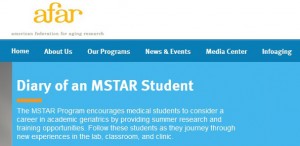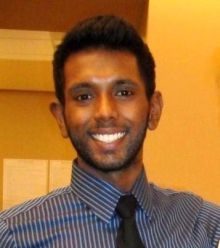 Looking for a feel-good read this summer? Check out the “Diary of an MSTAR” blog on the American Federation for Aging Research website. The postings from participants in AFAR’s Medical Student Training in Aging Research (MSTAR) program will give you hope that we’ll have future scientists finding cures for diseases like Alzheimer’s and physicians who will have the skills and compassion needed to take care of us as we age.
Looking for a feel-good read this summer? Check out the “Diary of an MSTAR” blog on the American Federation for Aging Research website. The postings from participants in AFAR’s Medical Student Training in Aging Research (MSTAR) program will give you hope that we’ll have future scientists finding cures for diseases like Alzheimer’s and physicians who will have the skills and compassion needed to take care of us as we age.
Take this excerpt from a July 10 post by Jerome Atputhasingam of the University of California, San Francisco. He is one of 140 scholars spending his summer at a top medical school geriatrics division, participating in the MSTAR mentored research, clinical, and educational experience:
When I entered the examination room at the UCSF’s Memory and Aging Center (MAC), I was completely unaware of who I would meet inside. Having just started my MSTAR project, I was only beginning to get a grasp of my environment and barely had a clue about the types of patients seen at MAC. On this particular day, I was greeted by an older aged woman and her husband. As I began to introduce myself, I realized that the woman struggled to introduce herself back to me. She had a hard time speaking words, much less complete sentences.
 Jerome Atputhasingam
Jerome AtputhasingamHe goes on to describe the husband and wife, their loving interactions, and their obvious struggle with the woman’s declining cognitive state. He continues:
What would such separation of mind and body cause a human being?
All throughout the interview, I couldn’t help but feel deeply connected to the humanness of this woman’s struggle. Though the disease was something completely foreign to me, I felt the gravity of the human moments we shared. At the end of the interview, the attending asked her if she had any questions. She turned her neck to look at her husband and then turned back to look at the doctor. Slowly, she said, “It’s only going to get worse, isn’t it?”
I felt the already silent room become more silent. The attending, as much as he hated what was about to come out of his mouth, mustered up the courage and said “Yes, and unfortunately we don’t have anything we can do to make it better.”
It was a moment I will never forget. In that moment, I understood why so many people around the world work tireless hours researching, trying their best to find something, anything that would elucidate an aspect of the human body. It is because when another patient asks the same question as this woman, we can say, “We can stop it from getting worse” or even better, “We can help you recover fully.” For me, that is the magic of research.
Throughout the posts, you get a sense of the myriad reasons to choose a career in geriatrics and aging research. For some students, like David Lee of the University of California, Irvine, it is the complexity of older adults and their health care needs that he finds so rewarding. He wrote on July 12:
I started going into the clinic to shadow my geriatrician mentor this week. It was a great experience and further supported my passion to pursue geriatrics. I love the fact that every patient who saw my mentor had a different health condition and that it was a challenge to juggle the medication list, the various chronic conditions, and the acute condition of the patient.
The MSTAR program is designed to encourage or solidify an interest in caring for older adults among medical students early in their education. Through the voices of the MSTAR scholars, we can see how effective the program is. I hope you’ll join me in following the “Diary of an MSTAR” blog this summer. I expect we’ll have more students conclude their program the way Sydney Harvey of the University of North Texas Health Sciences Center at Fort Worth did last year when she wrote:
I wasn’t aware of how much the MSTAR would make me ponder where I would practice, what I would do in academic medicine, and what kinds of patients I want to see. The geriatric population is intensely diverse and rich in history. These patients have so much wisdom to offer, so much life to share. It’s a privilege to take care of them.
Learn more about the MSTAR program and follow the “Diary of an MSTAR” blog at www.afar.org. Make a donation to support MSTAR scholars and their summer experience in geriatrics and aging research at http://www.afar.org/home/donate.
